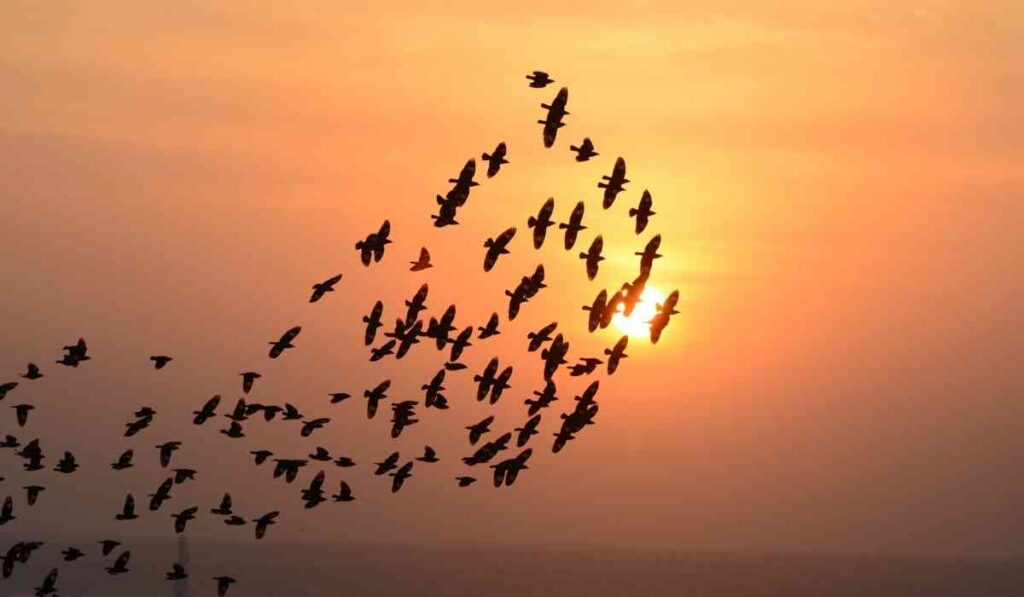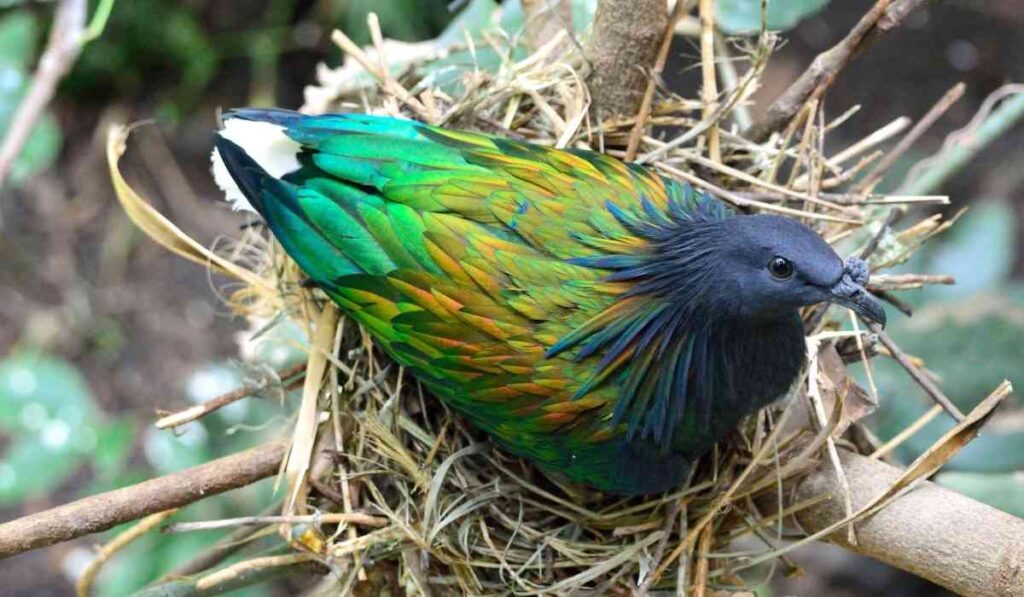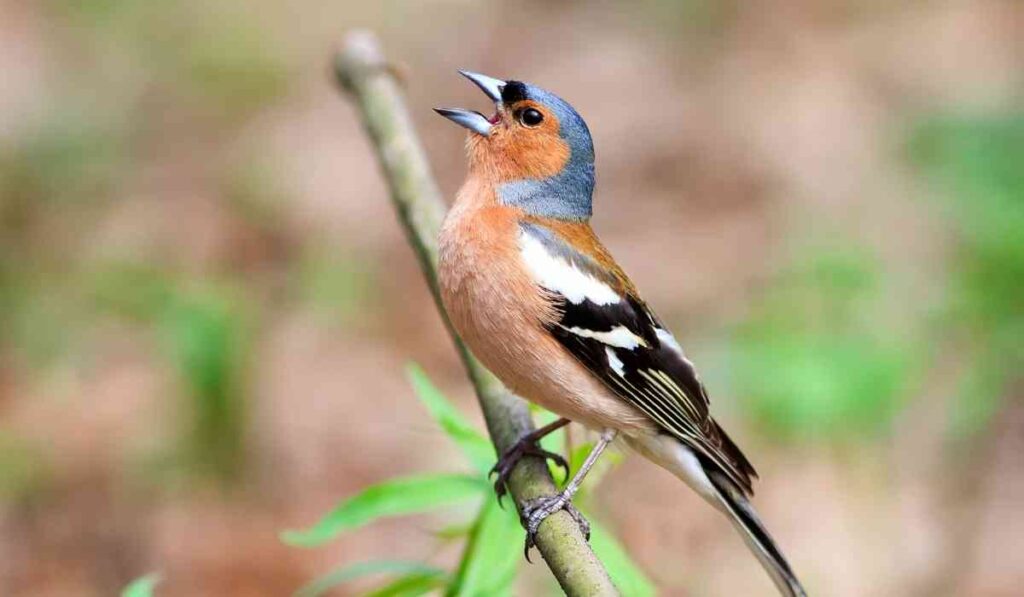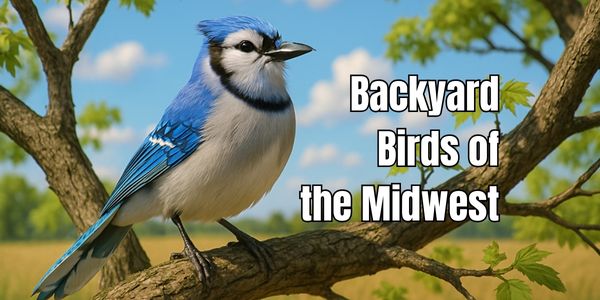What is Bird Behavior? Instinct Vs. Learned Behavior
Bird behavior encompasses the actions, habits, and responses of birds in their natural environments. These behaviors include feeding, mating, migration, & communication.
Bird behavior is an outstanding area of study. Birds exhibit a wide range of behaviors that help them survive and reproduce.
Migration is another critical behavior where birds travel long distances to find suitable climates and breeding grounds. Communication through songs, calls, and body language plays a crucial role in social interactions and territory defense.
Table of Contents
Benefits Learning Bird Behavior

What is Bird Behavior? Bird behavior provides insight into their communication, migration patterns, and survival strategies. Observing these behaviors can enhance bird-watching experiences and contribute to conservation efforts.
Bird behavior is fascinating and offers numerous benefits to those who study it. These behaviors can deepen our appreciation for these creatures and enhance our interactions with them.
Improved Birdwatching Experience
Birdwatching becomes richer with knowledge of bird behavior. Observing birds is more rewarding when you understand their actions.
- Identifying species: Helps distinguish similar-looking birds by their behavior.
- Recognizing calls: Differentiate between alarm calls and mating calls.
- Anticipating movements: Predict where birds will go next, enhancing your viewing experience.
- Interpreting interactions: Understand social dynamics and hierarchy within flocks.
Contribution To Conservation Efforts
Learning bird behavior aids conservation efforts. It provides insights into their needs and challenges.
- Habitat preferences: Identifies critical areas for protection.
- Breeding patterns: Helps in creating breeding programs.
- Migration routes: Informs about safe corridors for travel.
- Stress indicators: Detects environmental stressors affecting bird populations.
Enhancing Personal Well-being
Observing bird behavior positively impacts personal well-being. It offers mental and emotional benefits.
Birdwatching can reduce stress levels. The calmness of nature and the beauty of birds promote relaxation. Additionally, it encourages outdoor activity, contributing to physical health.
Educational Opportunities
Bird behavior study opens various educational avenues. It can be a rich source of learning for all ages.
- Inspiring curiosity: Sparks interest in wildlife and nature.
- Teaching patience: Cultivates a patient and observant mindset.
- Promoting research skills: Encourages the development of scientific inquiry.
- Enhancing knowledge: Expands understanding of ecology and environmental science.
Strengthening Connection With Nature
Observing birds, we connect with their daily lives and also can get the answer to what is bird behavior? This connection can inspire a commitment to protect and preserve their habitats. It enriches our lives and promotes environmental stewardship.
How To Stop Hormonal Behavior In Birds

Understanding bird behavior helps manage hormonal changes. Ensure a consistent routine, provide mental stimulation, and maintain a balanced diet.
Birds display a wide range of behaviors, especially when they enter breeding season. Understanding how to curb hormonal behavior in birds is essential for their well-being and your peace of mind.
Recognizing Hormonal Behavior
Many bird owners can identify hormonal behavior through a few common signs:
- Increased Aggression: Birds may bite or lunge more frequently.
- Excessive Screaming: Vocalization can become louder and more persistent.
- Nesting Behavior: Birds might start shredding paper or gathering materials for a nest.
Adjusting The Bird’s Environment
A few changes in the bird’s surroundings can help reduce hormonal behavior:
- Light Exposure: Limit daylight hours to mimic non-breeding season.
- Cage Location: Place the cage in a quieter, less stimulating area.
- Toys and Perches: Rotate toys and perches to keep the bird mentally engaged.
Diet Modifications
Altering the bird’s diet can also play a crucial role in managing hormonal behavior:
- Reduce High-Fat Foods: Lower the intake of seeds and nuts.
- Fresh Vegetables: Offer more leafy greens and low-sugar fruits.
- Balanced Nutrition: Ensure the bird receives a well-rounded diet.
Behavioral Training
Training can help modify unwanted behaviors in birds:
- Positive Reinforcement: Reward good behavior with treats and praise.
- Ignore Negative Actions: Avoid reinforcing bad behavior with attention.
- Consistent Routine: Establish and stick to a daily routine for feeding and interaction.
Veterinary Consultation
Sometimes professional help is needed. Consulting a vet can provide valuable insights:
- Health Check: Rule out any underlying health issues.
- Hormonal Treatments: Explore medical options like hormone therapy.
- Expert Advice: Get tailored advice specific to your bird’s needs.
Understanding and implementing these strategies can significantly reduce hormonal behavior in birds, leading to a happier and more harmonious home environment.
Is A Bird Building A Nest A Learned Behavior?

Bird behavior often includes instinctual actions like building nests. Birds construct nests without prior learning, driven by innate instincts. This fascinating aspect showcases their natural abilities.
Birds exhibit a wide array of fascinating behaviors, one of which is nest building. This activity raises the question: is nest building a learned behavior or an instinctual one? The nuances of this behavior can shed light on the intricate lives of our feathered friends.
Instinct Vs. Learned Behavior
Birds build nests using a mix of instinct and learning. Let’s explore the distinctions:
- Instinctual Behavior: This is behavior that is hardwired into a bird’s genetic makeup. Birds know instinctively how to build nests without being taught.
- Learned Behavior: This involves observing and mimicking other birds. Young birds watch experienced birds and learn techniques for nest building.
- Species-Specific Techniques: Each species has a unique method of building nests. These techniques are usually instinctual, but can be refined by learning.
Role Of Environment In Nest Building
The environment plays a significant role in how birds build nests. Birds adapt their building techniques based on available materials and conditions.
- Material Availability: Birds use what they find in their environment. This includes twigs, leaves, and even human-made materials.
- Location Choice: Birds select nesting sites based on safety and proximity to food. This choice is both instinctual and learned.
- Climate Adaptations: Birds build nests that can withstand their local climate. This involves both innate knowledge and learned adjustments.
Importance Of Social Learning
Social learning significantly impacts a bird’s nest-building skills. Observation and interaction with other birds are crucial.
- Parental Teaching: Parent birds often demonstrate nest-building techniques to their young. This hands-on learning is vital for skill development.
- Peer Influence: Birds also learn from their peers. Watching how other birds build nests can provide new insights and techniques.
- Community Behavior: In some species, nest building is a communal activity. This promotes learning and refinement of techniques.
Evolutionary Perspective
From an evolutionary standpoint, nest building is a critical survival skill. Birds have evolved to perfect this behavior over generations.
- Survival of the Fittest: Birds with better nest-building skills are more likely to survive and reproduce. This passes on these traits to future generations.
- Adaptation and Innovation: Birds continuously adapt their nest-building techniques. This ensures they can cope with changing environments.
- Genetic Predisposition: Some aspects of nest building are genetically encoded. This ensures that even without learning, birds can build functional nests.
Observations In Captivity
Studies of birds in captivity provide insights into the nature of nest building. These controlled environments reveal the balance between instinct and learning.
- Controlled Experiments: Researchers use controlled settings to study nest-building behavior. This helps isolate the instinctual aspects.
- Learning Opportunities: Captive birds often have opportunities to observe and learn from each other. This highlights the importance of social learning.
- Behavioral Variations: Differences in nest-building behavior among species in captivity provide clues about the role of genetics and environment.
Understanding whether nest building is a learned behavior involves examining various factors. Both instinct and learning play crucial roles in this fascinating aspect of bird behavior.
Is Flying a Learned Behavior for Birds?

Bird behavior encompasses various activities, including flying, which is a learned skill for many species. Young birds often observe and practice before mastering flight.
Birds are fascinating creatures with a variety of behaviors that intrigue both scientists and bird watchers. One of the most captivating aspects is their ability to fly. Is flying a learned behavior for birds? Let’s delve into this topic.
Instinctual Vs. Learned Behavior
Birds exhibit both instinctual and learned behaviors. Flying is primarily instinctual, but some learning is involved.
- Natural Instinct: Birds are born with the innate ability to fly.
- Learning Process: Young birds practice and improve their flying skills over time.
Role Of Parent Birds
Parents play a significant role in teaching their chicks to fly. Here’s how:
- Guidance: Parent birds demonstrate flying techniques.
- Encouragement: They coax their young out of the nest.
- Protection: Parents ensure a safe environment for practice.
Environmental Influence
Birds’ surroundings also impact their flying abilities. Different environments provide varied challenges and learning opportunities:
- Urban Areas: Birds adapt to obstacles like buildings and vehicles.
- Natural Habitats: Forests and fields offer different flying challenges.
Practice Makes Perfect
Young birds spend a lot of time practicing. This practice is crucial for mastering their flying skills:
- Short Flights: Start with brief, low flights.
- Building Strength: Gradually increase distance and altitude.
- Coordination: Improve wing and body coordination through repetition.
Social Learning
Birds often learn from observing others. This social aspect plays a part in their flying education:
- Flock Dynamics: Birds in a flock learn from each other.
- Mimicry: Young birds imitate the flying patterns of older, experienced birds.
Genetic Predisposition
Some birds are genetically predisposed to be better fliers. This genetic factor cannot be overlooked:
- Species Variation: Different bird species have varying flying capabilities.
- Inherited Traits: Flying skills can be passed down through generations.
Understanding bird behavior, particularly flying, reveals a blend of instinct and learning. Birds are born with the ability to fly, but they refine their skills through practice, parental guidance, and environmental interactions.
Which Best Describes Singing Behavior In Birds

Bird behavior often involves singing to establish territories and attract mates. Birds use specific songs to communicate and defend their space.
Birds captivate us with their melodious songs, often heard at dawn or dusk. Their singing behavior is more than just a delight to our ears. It serves multiple functions in their daily lives.
Purpose Of Bird Songs
Birds sing for several reasons. These melodies can convey crucial information:
- Territory establishment: Males often sing to claim and defend their territory.
- Mate attraction: Singing showcases a bird’s fitness to potential mates.
- Communication: Songs can signal distress or alert others to predators.
Seasonal Variations In Singing
Birdsong frequency and intensity can change with the seasons. This variation is important to note:
- Breeding season: Singing peaks as birds compete for mates.
- Non-breeding season: Songs reduce, often limited to calls for communication.
- Migration periods: Some species sing during migration to stay in touch with their group.
Learning And Development Of Songs
Young birds must learn their species-specific songs. This learning process is fascinating:
- Listening and mimicking: Juvenile birds listen to adults and practice singing.
- Critical learning period: There is a specific timeframe when they are most receptive to learning.
- Song crystallization: Eventually, their songs stabilize into adult patterns.
Differences Between Species
Not all bird songs are created equal. Each species has unique characteristics:
- Song complexity: Some species have simple tunes, while others have elaborate sequences.
- Repertoire size: Certain birds have extensive repertoires, singing hundreds of different songs.
- Regional dialects: Birds of the same species may sing differently in various geographic areas.
Bird singing behavior is a complex and multifaceted phenomenon. Understanding its nuances helps us appreciate the avian world even more.
Read More:
- Do Cardinals Attack Other Birds Nests? Uncover the Truth
- List of Rare Birds in the World: Discover Elusive Avians
- Why Do Budgies Bob Their Heads Up And Down?
- Identifying Birds by Chest Color
Frequently Asked Questions on What is Bird Behavior
What Behavior Is Common To All Birds?
All birds have feathers and lay eggs. They possess beaks and are warm-blooded. Most birds can fly, though some are flightless.
What Is Bird Affection Behavior?
Bird affection behavior includes preening each other, cuddling, vocalizing softly, and feeding each other. These actions show trust and bonding.
What Are The Actions Of Birds?
Birds fly, sing, and build nests. They hunt for food, migrate, and communicate with each other. Birds also care for their young.
What Do Birds Do When They Like You?
Birds show affection by chirping, preening, and sitting close. They may mimic your actions and follow you around.
Conclusion
Understanding bird behavior enhances our appreciation of these fascinating creatures. Their complex actions reveal much about their survival and communication.
Observing birds closely offers insights into their world. Keep exploring and learning about bird behavior to deepen your connection with nature.
Stay curious and enjoy the wonders of avian life.






